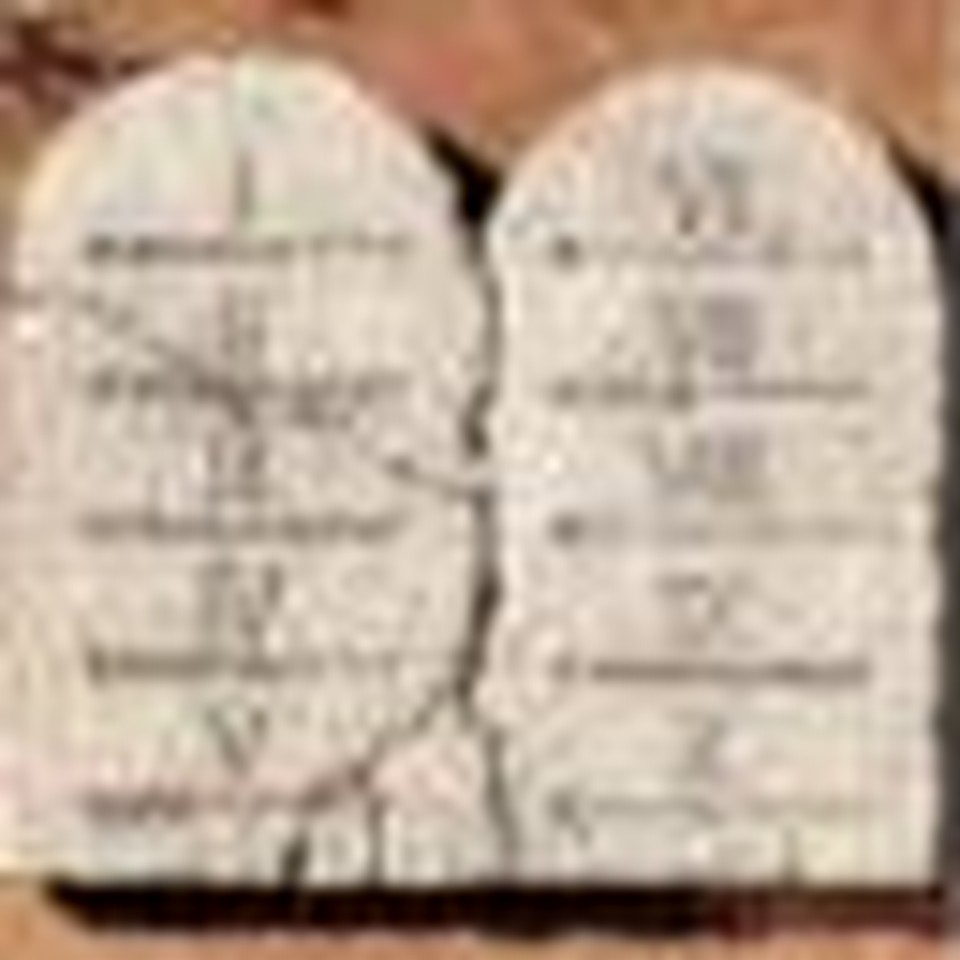Counting the Ten Commandments

One of the most enduring elements of the Bible and the Judaeo-Christian worldview within Western culture is the Decalogue, the Ten Commandments. Even if one can't recite them all, most people have seen the fiery finger of God etch the commandments into two stone tablets as Moses—for many of us, Charlton Heston—watches in awe.
It seems to go without saying that the list of the Ten Commandments is something that Judaism and Christianity have always agreed upon. Well, that is not exactly true.
Historically speaking, Jews and Christians—and even denominations within Christianity—have disagreed on exactly how the Ten Commandments should be listed and expressed. In fact, how to precisely spell out the commandments was an issue of considerable importance during the Protestant Reformation. The difference concerns how many commands are to be found in the first six verses and last two verses of Exod 20:2-17, the initial listing of the commandments received by Moses at Sinai (with respect to the second listing of the commandments in Deut 5, this issue concerns Deut 5:6-21). The chart opposite illustrates the disagreements.
One point of context is required before we can understand the thinking behind the differences in the listing and expression of the commandments. Any listing of the commandments must result in a total of ten, because three other passages of Scripture fix the number of commandments at ten. Exodus 34:28, Deut 4:13, and Deut 10:4 each clearly tell us that God gave Moses ‘asereth hadvarim ("ten words"; "ten statements") at Sinai.
Interestingly, the Jewish tradition treats the statement in Exod 20:2 (compare Deut 5:6) as a command when the wording has no imperative force to it at all. This latitude arises from the fact that the Hebrew text of the Old Testament exclusively uses ‘asereth hadvarim ("ten words") instead of ‘asereth hamitsvot ("ten commandments") with respect to the contents of Exod 20 and Deut 5. After regarding Exod 20:2 as the first "word" of the ten, verses 3-6 are then thematically understood as speaking to a single prohibition: making idols for worship.
There are actually three imperative statements in this group of verses ("You shall have no other gods before me"; "You shall not make for yourself a carved image"; "You shall not bow down to them or serve them"), but to consider them as separate commands would move the total beyond ten.
Christian perceptions of Exod 20 are not rooted in the Hebrew terminology ‘asereth hadvarim ("ten words"), and so Christian formulations do not regard verse one as the first point of the Decalogue. As a result, all of Exod 20:2-6 is considered the starting point, and the imperative wording ("You shall not") prompted the "commandment" terminology so widely known and used today (Orthodox churches do not consider verse 2 a prefatory comment. Rather, all of verses 2-3 are considered the first commandment).
The enumeration adopted by Roman Catholicism, Anglicanism, and Lutheranism originated with Augustine. While they prefer it, the enumeration of Augustine is not a point of dogma. Section 2066 of the Catechism of the Catholic Church is representative of the acknowledgement that, "The division and numbering of the Commandments have varied in the course of history" (Catechism of the Catholic Church, 2nd ed. (Doubleday, 2003). See also note 20a in The Jerusalem Bible (Doubleday, 1966) on Exod 20). Reformed Protestants and Greek Orthodox Christians also reject verse 1 as a command, but distinguish verse 3 from verses 4-6 as the first and second commands. This position is likewise not dogmatically taken.
The last two verses are the other major point of divergence in expressing the number and contents of the commandments. Roman Catholicism, Anglicanism, and Lutheranism divide Exod 20:17 into two commands to achieve the number ten, a necessity in view of seeing Exod 20:2-6 as the first command. This dichotomy is perhaps puzzling, since the entirety of the content of verse 17 speaks about one's household and possessions, and in light of the thematic grouping at the beginning of the Decalogue. Thematic grouping at the beginning of the Decalogue and thematic splitting at the end doesn't make sense—unless one keeps in mind the need to wind up with ten!
Despite the numerical disagreement over how to count the commandments, the moral core of the Judaeo-Christian ethic has never been in doubt among those Jews and Christians who take the Bible seriously. A lack of certainty on how to count the Ten Commandments is no impediment to understanding their importance for honoring God and our fellow human beings.
A full interactive chart for this article can be viewed online.
Notes
Catechism: A summary of religious doctrine often in the form of questions and answers.

Publication date: July 12, 2010
Originally published July 12, 2010.




